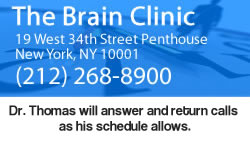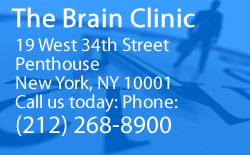
Symptoms/Etiology The terms anoxia and hypoxia are often used interchangeably, although anoxia refers to a complete lack of oxygen in the arterial blood or tissue and hypoxia refers to a reduction in oxygen in the tissue. The term hypoxemia, also sometimes used interchangeably, refers to the reduction of oxygen saturation in arterial blood. Although the […]
Many breast cancer patients often complain of brain fog, confusion and decreased attention after receiving chemotherapy; this phenomenon is often referred to as “chemobrain”. For some individuals, these effects persist even after chemotherapy has ultimately stopped. The numbers vary greatly and studies suggest that anywhere from 15 to 50% of breast cancer patients experience the […]

Migraines and chronic headaches can be detrimental to your family, job, income, and overall well-being. Drugs can be expensive, ineffective, cause unwanted side-effects and are often unnecessary. In many cases, including pregnancy, it is best to treat these ailments without medications. The Brain Clinic offers alternative, non-pharmaceutical treatments such as biofeedback and neurofeedback which are extremely effective […]

Neurofeedback is when the patients are trained to control their own brain physiology, which can be either their own brain waves (electroencephalography or EEG), or their frontal cerebral blood flow (Hemoencephalography or HEG). The display can be the brain waves themselves (good for some patients), a display generated by the computer or a movie that […]

About Traumatic Brain Injury Traumatic brain injury (TBI) can result in problems of cognition, behavior, emotional sensitivity, and attention. Patients can frequently become much more impulsive, appear to have poor judgment, have problems with memory or finding words, and often are not very aware of these problems. Planning and organizing can also be significant deficits […]

Depression is a devastating disorder that can be very difficult to cure. Cognitive therapy is always helpful but sometimes that alone is not enough, and prescription medications may be unwanted, ineffective or expensive. Neurofeedback is a non-pharmaceutical option for treating depression that is offered at The Brain Clinic in New York City. Neurofeedback is a form […]

It is hard for many families to afford the high cost of learning disability evaluations, which can range from $3,700 to as much as $5,000. Well, there is good news for those families. There has been an IRS ruling that says that these evaluations can be tax deductible as a medical expense. Disclaimer: Dr. Thomas is neither […]

What is a Learning Disability? People who have a learning function (such as reading) which is significantly below average in some area have a learning disability in that area. In addition, there must also be some problems in more than one setting, such as work/school and home. This usually means that one must obtain an […]

OVERVIEW OF TRAUMATIC BRAIN INJURY REHABILITATION – from Nat’l Med Library 12/1/10 Adams H Systematic care for persons with brain injury: A place for case management. J Insur Med 1991 Winter;23(4):223-6. Ansell BJ. Slow-to-recover brain-injured patients: rationale for treatment. J Speech Hear Res 1991 Oct;34(5):1017-22. Ashley MJ, Krych DK. Traumatic brain injury rehabilitation. Boca Raton […]

Cognitive and fatigue problems after heart surgery (sometimes called cardiac bypass surgery). The patient who has had cardiac bypass surgery is usually not warned about possible cognitive problems after the surgery, and thus the person can sink into a depression because they do not understand why they cannot function the way they used to. Sometimes […]






